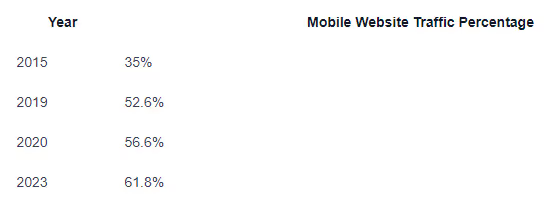Mobile SEO Statistics That Cant Be Ignored
The percentage of mobile device website traffic worldwide has been steadily increasing over the years.


Mobile SEO Statistics That Cant Be Ignored
Mobile SEO Landscape
In today's digital landscape, mobile devices play a significant role in website traffic and online interactions. Understanding the growth of mobile website traffic and the importance of mobile optimization is crucial for businesses aiming to stay ahead in the digital realm.
Growth of Mobile Website Traffic
The percentage of mobile device website traffic worldwide has been steadily increasing over the years. According to Statista, the share of website traffic coming from mobile devices has risen from the 1st quarter of 2015 to the 4th quarter of 2023, excluding desktop and tablet devices.

Data courtesy Statista
These statistics demonstrate the increasing reliance on mobile devices for accessing websites and highlight the need for businesses to prioritize mobile optimization to cater to this growing user base.
Importance of Mobile Optimization
With 54% of all website traffic generated from mobile phones, mobile optimization has become a critical component of digital marketing strategies [1]. The impact of mobile-friendly sites on conversions is significant, with 61% of consumers stating that they are more likely to purchase from mobile-friendly sites [1].
Statistics
54% of all website traffic is generated from mobile phones.
61% of consumers are more likely to purchase from mobile-friendly sites.
Data courtesy WebFX
Furthermore, mobile sales account for 55.25% of overall sales when comparing desktop and mobile platforms. These statistics underscore the importance of having a mobile-optimized website to capture leads and maximize conversions.
In the realm of search engines, Google dominates mobile searches, with 63% of searches occurring on mobile devices in the U.S.. This emphasizes the need for businesses to invest in mobile marketing and ensure their websites are optimized for mobile users on Google.
The future of internet usage is undoubtedly mobile-centric. Experts predict that by 2025, around 76% of internet users will access the web solely through their mobile devices. Companies that neglect mobile optimization may experience a decline in their website's rank on search engine results pages (SERPs) and hinder their online visibility.
Understanding the growth of mobile website traffic and the importance of mobile optimization is essential for businesses striving to succeed in the digital realm. By prioritizing mobile SEO, companies can tap into the immense potential of the mobile audience and ensure their websites are optimized for the mobile-first world.
Mobile Marketing Insights
In today's digital landscape, mobile marketing has become an essential component of any successful marketing strategy. Understanding the impact of mobile advertising, the importance of mobile-friendly sites on conversions, and the statistics surrounding mobile sales can provide valuable insights for businesses looking to optimize their mobile SEO efforts.
Mobile Advertising Budget Allocation
U.S. marketers are recognizing the significance of mobile advertising, with approximately 19% of marketing budgets allocated to mobile campaigns [1]. This indicates that companies are increasingly investing in mobile-first strategies to reach their target audience effectively.
Impact of Mobile-Friendly Sites on Conversions
Creating a mobile-friendly website is no longer an option but a necessity. Studies show that 61% of consumers are more likely to make a purchase from mobile-friendly sites. The ease of navigation and optimized user experience play a significant role in influencing consumer behavior and driving conversions. To maximize the potential of mobile SEO, businesses must ensure that their websites are responsive, fast-loading, and provide a seamless mobile browsing experience.
Mobile Sales Statistics
The rise of mobile devices has transformed the way consumers shop and make purchase decisions. When comparing desktop and mobile sales, mobile sales account for an impressive 55.25% of total sales [1]. This statistic highlights the importance of having a mobile-optimized site to capture leads and drive revenue. Businesses that neglect mobile optimization may miss out on a significant portion of potential sales.
To capitalize on these mobile marketing insights, it's crucial for businesses to invest in mobile SEO strategies that align with consumer behavior and preferences. By prioritizing mobile advertising, creating mobile-friendly sites, and optimizing for mobile sales, businesses can effectively engage their target audience and drive conversions in the ever-growing mobile landscape.
Google and Mobile
In the ever-evolving world of mobile SEO, Google plays a pivotal role. Understanding Google's influence on mobile searches, page load times, and user experience is crucial for optimizing your website for mobile devices.
Dominance of Mobile Searches
Mobile searches have become the norm in today's digital landscape. In the United States, a staggering 63% of Google searches occur on mobile devices, emphasizing the need for businesses to invest in mobile marketing to reach this significant audience segment. With the majority of users relying on their smartphones for information and services, it is essential to ensure that your website is optimized for mobile devices to capture this valuable traffic.
Mobile Page Load Times
When it comes to mobile SEO, page load times are a critical factor to consider. Users expect websites to load quickly on their mobile devices, and Google recognizes this user preference. In fact, Google released the Speed Update in July 2018, which made mobile page speed a direct ranking factor. This update highlights the increasing importance of mobile site speed in SEO.
To provide a seamless user experience, it is essential to optimize your website for fast loading on mobile devices. Minimizing file sizes, leveraging browser caching, and optimizing images are just a few strategies to improve mobile page load times. By prioritizing speed, you can enhance user satisfaction and potentially improve your search engine rankings.
User Experience on Mobile
User experience (UX) is a critical aspect of mobile SEO. Google rewards businesses with mobile-optimized web development by indexing mobile sites first. Since 2019, Google predominantly uses the mobile version of content for indexing, further emphasizing the importance of being mobile-friendly [2]. However, it's important to note that while Google considers responsive design as the recommended design pattern, the type of mobile site doesn't directly impact ranking.
To provide a positive user experience on mobile devices, ensure that your website is responsive and adapts seamlessly to different screen sizes. This allows users to navigate and consume your content easily, regardless of the device they are using. By prioritizing mobile-friendly design and providing a smooth browsing experience, you can increase user engagement and potentially improve your website's visibility and lead generation.
Understanding the dominance of mobile searches, the impact of mobile page load times, and the significance of user experience on mobile devices is crucial for effective mobile SEO. By aligning your website with Google's mobile-first indexing and focusing on mobile optimization, you can enhance your online presence and connect with the growing number of mobile consumers.
Mobile SEO Strategies
In the ever-evolving landscape of mobile SEO, implementing effective strategies is crucial to maximize visibility and reach on mobile devices. This section explores three key strategies: product recommendations on mobile, benefits of mobile apps, and mobile site vs. app preferences.
Product Recommendations on Mobile
When it comes to mobile commerce, product recommendations play a significant role in driving conversions. According to Think with Google, 27% of smartphone users are more likely to purchase from companies that offer relevant product recommendations on their mobile sites or apps.
By leveraging personalized recommendations based on user behavior and preferences, businesses can enhance the user experience and guide customers towards relevant products. This not only increases the chances of conversion but also contributes to customer satisfaction and loyalty.
Benefits of Mobile Apps
Mobile apps have become an integral part of the digital landscape, offering unique advantages for businesses. According to Think with Google, 33% of smartphone users are more likely to use a brand's mobile app if they can earn rewards or points while browsing or shopping. This incentive-driven approach encourages user engagement and fosters brand loyalty.
Mobile apps provide a more personalized and seamless experience compared to mobile websites. They allow businesses to leverage features like push notifications, offline accessibility, and enhanced customization. Moreover, apps can take advantage of device capabilities, such as utilizing the camera for augmented reality experiences or integrating with biometric authentication for added security.
Mobile Site vs. App Preferences
While mobile apps offer unique benefits, it's important to consider user preferences when deciding between a mobile site and an app. According to Think with Google, 37% of smartphone users prefer using a company or brand's mobile site rather than downloading an app when making a one-time purchase. This highlights the need for businesses to provide a seamless mobile site experience to cater to a wide range of users.
It's crucial to ensure that your mobile site is optimized for speed, usability, and responsiveness. This includes implementing mobile-friendly design, optimizing page load times, and providing a user-friendly interface. By meeting these requirements, businesses can accommodate users who prefer using mobile sites for their one-time purchases while still considering the benefits of developing a mobile app for long-term engagement and loyalty.
By incorporating these mobile SEO strategies, businesses can enhance their online presence, engage users effectively, and drive conversions. It's important to continually monitor and adapt these strategies to stay ahead in the dynamic world of mobile SEO.
Mobile SEO Trends
As the mobile landscape continues to evolve, it's important for businesses to stay up-to-date with the latest mobile SEO trends. This section highlights three key trends that are shaping the future of mobile internet usage and mobile optimization strategies.
Future of Mobile Internet Usage
The future of internet usage is undoubtedly mobile-centric. According to a report by the World Advertising Research Center (WARC), it is projected that by 2025, approximately 76% of internet users will access the web exclusively through their mobile devices. This statistic underscores the importance of optimizing websites for mobile devices to effectively reach and engage with the growing number of mobile users.
To cater to this mobile-first audience, businesses must prioritize mobile optimization strategies, such as responsive web design, fast page loading times, and mobile-friendly user experiences. By embracing the future of mobile internet usage, businesses can position themselves for success in the digital landscape.
Google's Mobile-First Indexing
Since 2019, Google has shifted to mobile-first indexing, meaning that it predominantly uses the mobile version of content for indexing and ranking purposes. This change reflects the search engine's recognition of the increasing number of mobile users and the need to prioritize mobile-friendly experiences.
With mobile-first indexing, Google crawls and indexes the mobile version of websites before the desktop version. This shift emphasizes the importance of having a mobile-friendly website design and mobile-optimized content. To ensure visibility and lead generation, businesses must prioritize mobile optimization and focus on creating a seamless user experience for mobile users.
Significance of Mobile Responsiveness
Mobile responsiveness plays a vital role in SEO, enhancing the user experience by providing faster loading times and better usability on mobile devices. Factors such as ease of navigation and content readability contribute significantly to SEO success, particularly for businesses relying on local traffic.
With the upward trend in mobile usage, businesses must prioritize mobile responsiveness in web design to stay ahead of the SEO curve. Google continues to emphasize the importance of mobile responsiveness with each algorithm update. Therefore, partnering with knowledgeable web designers who understand the intricacies of mobile optimization is crucial for achieving online success [4].
By keeping a close eye on the future of mobile internet usage, embracing Google's mobile-first indexing, and prioritizing mobile responsiveness, businesses can adapt their SEO strategies to cater to the needs of the growing mobile audience. Mobile optimization is no longer an option but a necessity for staying competitive in the digital landscape.
Site Speed and SEO
When it comes to mobile SEO, site speed plays a crucial role in determining search engine rankings and overall user experience. The impact of site speed on SEO, particularly in mobile optimization, cannot be ignored. Let's delve into the importance of mobile page speed and explore tools that can enhance site speed.
Impact of Site Speed on SEO
Google has emphasized the importance of site speed in its search algorithms. The Speed Update released in July 2018 made mobile page speed a direct ranking factor, highlighting the significance of fast-loading mobile sites for SEO [5]. Slow-loading sites not only frustrate users but also contribute to higher bounce rates and lower search rankings.
Research by Google has revealed that 53% of mobile users abandon websites if they take longer than 3 seconds to load. This statistic underscores the critical importance of site speed for mobile SEO, as fast-loading sites are more likely to retain users and perform well in search engine rankings.
Importance of Mobile Page Speed
Mobile users, especially in "I want to" moments, prioritize speed as they seek quick answers without delay. Additionally, 91% of smartphone users turn to their phones for ideas while multitasking, indicating the importance of catering to users' short attention spans [5]. Google's own research also highlights the significance of mobile page speed, considering that 70% of mobile network connections globally are expected to occur at 3G speeds or slower through 2020.
To address the need for faster loading times on mobile devices, websites should optimize their mobile page speed. This involves various strategies, such as minimizing server response time, leveraging browser caching, compressing images, and reducing the number of HTTP requests.
Tools for Enhancing Site Speed
Enhancing site speed can be achieved through the use of various tools and techniques. Some notable tools that can help optimize mobile page speed include:
- Google's PageSpeed Insights: This tool provides valuable insights into a website's performance, highlighting areas for improvement and offering suggestions to enhance site speed. It analyzes both desktop and mobile versions of a website, providing specific recommendations for optimization.
- Accelerated Mobile Pages (AMP): AMP is an open-source framework that enables the creation of lightweight HTML pages, optimized for fast loading on mobile devices. By implementing AMP, websites can reduce their mobile site's loading time by up to 85%, delivering a seamless and speedy user experience.
- Content Delivery Networks (CDNs): CDNs distribute website content across multiple servers globally, allowing users to access content from the server closest to their location. This reduces latency and improves site speed, particularly for users accessing the website from different parts of the world.
By utilizing these tools and implementing best practices for site speed optimization, businesses can improve their mobile SEO performance, enhance user experience, and boost search engine rankings.
In conclusion, site speed is a critical factor in mobile SEO. The impact of site speed on search engine rankings and user satisfaction cannot be underestimated. Optimizing mobile page speed is essential for retaining users, reducing bounce rates, and ultimately improving overall website performance. By leveraging tools and techniques to enhance site speed, businesses can stay ahead in the competitive landscape of mobile SEO.
References
[1]: https://www.webfx.com/digital-marketing/statistics/mobile-marketing-statistics/
[2]: https://codeless.io/mobile-seo-mistakes/
[3]: https://www.woorank.com/en/edu/seo-guides/mobile-page-speed/
[4]: https://www.knowmad.com/blog/mobile-responsiveness-google-ranking-factor-seo
[5]: https://www.woorank.com/en/edu/seo-guides/mobile-page-speed
[6]: https://www.cloudflare.com/learning/performance/how-website-speed-boosts-seo/







